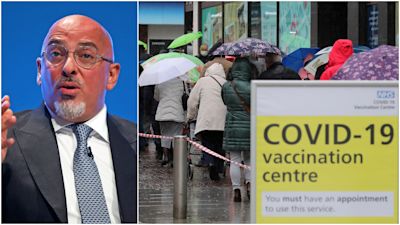Covid: Booster jabs by September but virus could spread like 'wildfire' in some areas

Watch above: Political Correspondent Carl Dinnen on the plan for booster jabs
By September the UK will be ready to begin a booster jab campaign, which will see the most vulnerable to coronavirus receive a third vaccination, the vaccines minister has told ITV News.
With all those in the top nine priority groups having been offered a vaccine, the UK is looking to boost protection from Covid-19 in those who got the jab first because, as Nadhim Zahawi says, the antibodies provided by the shot may have reduced.
But deadly Covid-19 virus is still capable of spreading like "wildfire" in communities where vaccine take-up is low, he told ITV.
More than half of the UK's adult population is now at least partially immune after receiving a single dose of a coronavirus vaccine - and almost 16 million people have had both - but some communities have comparatively low take-up.
A recent Office for National Statistics survey found that just 59% of Black African adults in England aged over 70 had received at least one jab, a figure which was dwarfed by their White counterparts of whom at least 91% had been vaccinated.
Weird and wonderful incentives encouraging people to get vaccinated
UK to stay ‘one step ahead’ of virus with investment in testing labs
The report - covering December 8, 2020 to March 11, 2021 - also found that less than 75% of England’s over 70s in Pakistani and Bangladeshi communities had received a shot.
Vaccines Minister Nadhim Zahawi told Good Morning Britain: “We are now able to see exactly where, by postcode, which communities we need to really focus on.
“We are running some pilots in places like Luton on offering the vaccine to multi-generational households.
“Vaccine positivity is incredibly high in the UK, it’s running at 83-84% of adults saying they will be vaccinated.
“Nine out of 10 45-year-olds have now got the protection of a single dose.
“That’s great, but that 14-15% where they are still hesitant, if the virus gets hold of those communities it will go through them like wildfire. I will not stand by and watch that happen.”
Many scientists believe a third wave of coronavirus could still hit the UK this year, but it's hoped new treatments and a booster jab programme can keep the number of deaths down.
The emergence of new variants - such as those first identified in South Africa and Kent - is the biggest threat to the UK's roadmap away from coronavirus restrictions, but the government is attempting to mitigate their impact.
An order of 60 million additional Pfizer vaccines has been made, in order to begin the booster scheme in autumn, and the government has just made a multi-million pound investment to "future-proof" the UK against new variants of Covid-19.
Listen to the ITV News Coronavirus Podcast:
Mr Zahawi said £29.3 million of new money will help to "make sure we have vaccine variants that are ready for any virus variant that may escape."
He said deputy chief medical officer Professor Jonathan Van-Tam was looking at whether people should be given a booster of a different vaccine to enhance protection.
He added that the NHS will be "ready for deployment from September onwards", though a decision on when boosters will be given had not been made.
The new investment will deliver in January next year, adding the current vaccination programme was "working effectively against the dominant virus in the UK", he told Sky News.
In a further bid to keep new variants at bay, the UK's borders have effectively been closed for several month but in less than two weeks the government plans to restart some international travel.
A planned traffic light system for destinations presents a difficult balancing act for the government, with a need to reinvigorate the economy by allowing foreign holidays on one hand, and the threat of importing dangerous new variants on the other.
The new system is expected from May 17; countries will be designated as green, amber or red, with anyone returning from a green country not required to enter any form of quarantine.
Dr Jenny Harries, chief executive at the UK Health Security Agency (UKHSA), said: "A new variant that can escape the current vaccines is the greatest risk of a third wave.
"This new investment [in booster jabs] will help us stay one step ahead of the virus by doubling our capacity to test vaccine effectiveness against emerging variants.
"While we expect the existing vaccines to offer protection against new variants, particularly preventing serious illness and death, it is important that we continue to monitor the picture as it develops."